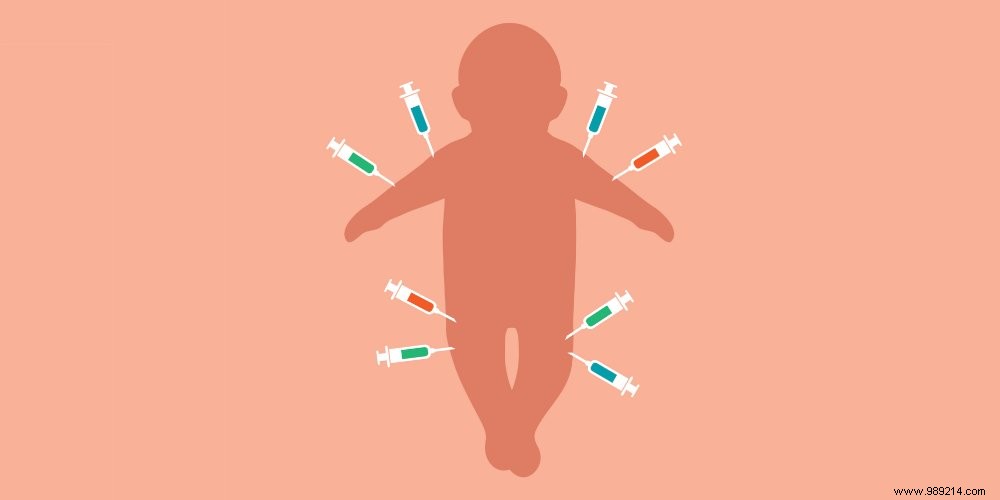 While "antivax" controversies continue on social networks, diseases that had almost disappeared are on the rise , for lack of a sufficient rate of vaccination. Worrying!
While "antivax" controversies continue on social networks, diseases that had almost disappeared are on the rise , for lack of a sufficient rate of vaccination. Worrying! French people remain reluctant about vaccines. The false information peddled on their supposed adverse effects has fueled suspicion so much that mistrust has set in:a third of the population fears the harmfulness of vaccines, according to a June 2019 survey carried out by the American Polling Institute Gallup.
"The 'antivax' are few in number, but they speak loudly and the internet has offered them a sounding board," notes Dr. Daniel Levy-Bruhl, head of the Respiratory Infections and Vaccination Unit of the Public Health Agency France, bitterly. Result:the vaccination coverage rate in France is low (80%) compared to other countries, such as Great Britain or Sweden, where it reaches 95%! Of course, vaccines can induce some side effects. But no offense to followers of conspiracy theories, their benefit-risk balance is largely positive.
Thanks to vaccination, two to three million lives are saved every year, says the World Health Organization (WHO).
Before the advent of vaccines in the 1970s, measles killed seven to eight million children worldwide. This ultra-contagious disease should now be a thing of the past. However, this is not the case:it is even in strong resurgence, mainly due to distrust of the vaccine. The fears arose in 1998 after the publication of a study that pointed to a link between the MMR (measles/mumps/rubella) vaccine and the occurrence of autism. Many researchers have since demonstrated that this hypothesis is totally unfounded. But the "antivax" continue to spread it in order to sow doubt.
Many also overlook this vaccine because they consider measles to be a mild disease, likely to cause at most a runny nose and rashes. This is a serious mistake because its consequences can be severe, sometimes even fatal. By affecting the immune system, measles increases the risk of acute diarrhea and infections by other viruses, such as influenza. Serious neurological complications (encephalitis) are also possible.
Video of the day:The WHO is formal:measles claimed 140,000 victims worldwide in 2018, 15% more than in 2017. And the progression intensified in 2019, with three times more cases from January to July 2019 than the previous year at the same period.
In some countries, the alert level has been greatly exceeded. In the Samoa Islands, 70 deaths were deplored in 2019, including 61 young children, according to Unicef. This is a considerable number for this small archipelago in the Pacific which has only 200,000 inhabitants. The situation was equally worrying in the Tonga Islands, Fiji, the Democratic Republic of the Congo and Madagascar. The disease also reappeared in the United States, with 1,249 patients reported, when its eradication was officially announced in the year 2000.
In the first half of 2019, 89,994 measles cases were reported in Europe (including 37 deaths), more than double the first six months of the previous year. A shame for "a disease completely preventable by vaccination", deplores Dr Tedros Adhanom Ghebreyesus, Director General of the WHO.
In 90% of cases, the infection occurs in people who have not been vaccinated or who have received only a single dose of vaccine, instead of the two regulatory doses. “By getting vaccinated, you protect yourself and others by preventing viruses from circulating,” explains Daniel Lévy-Bruhl. If too few people get vaccinated, the virus spreads rapidly. To stem the measles epidemic, at least 95% of the population must be immunized, which is not the case in France despite the vaccination obligation for infants which came into force in 2018.
The vaccine against papillomavirus (HPV), intended to prevent cancer of the cervix but also genital warts and many cancers of the anus or throat, has very bad press. Its detractors have long accused it of promoting the development of multiple sclerosis, lupus or macrophagic myofasciitis, a pathology characterized by muscle pain and chronic fatigue. And as the High Authority for Health (HAS) recommended at the end of 2019 to also extend it to all boys aged 11 to 14, with a possible catch-up from 15 to 19 years old, the controversy continues.
Its injection can certainly generate redness, pain or itching at the puncture site, a peak of fever or a headache, but several French and Canadian scientific studies have denied its responsibility in the onset of autoimmune diseases. Verdict:there are no more autoimmune diseases in young girls vaccinated against HPV than in those who are not. Given the number of people vaccinated, it is normal for some of them to develop illnesses in the months that follow, but these would have occurred with or without vaccination. In other words, causality should not be confused with temporal coincidence. Similarly, no strong study has been able to establish a causal link between the hepatitis B vaccine and multiple sclerosis according to the National Academy of Medicine.
On the other hand, "the anti-HPV vaccine seems to slightly increase the risk of Guillain-Barré syndrome, a neurological condition which results in damage to the peripheral nerves, recognizes Dr. Daniel Lévy-Bruhl, but in extremely low proportions:a two vaccine-induced cases per 100,000 young people vaccinated."
Read also: